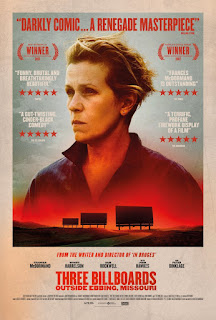
"Raped while dying". "And still no arrests." "How come, Chief Willoughby?" These are the sentences displayed on three billboards on a road near Ebbing, Missouri, paid for a year by Mildred Hayes, who wants to put pressure of Sheriff Willoughby to find the criminal who raped and killed her teenage daughter, Angela. After Willoughby commits suicide because he had cancer, the local townspeople are even more against Mildred, but she still wants to continue with the billboards. Mildred is also plagued by her divorce and her other teenage kid, Robbie. Police officer Jason overhears a man bragging about rape in a bar and thus gets into a fight with him to get some of his blood. The DNA analysis is negative, though. Jason and Mildred become friends and go on a trip to kill the man, anyway.
Better in its concept than in its execution, "Three Billboards Outside Ebbing, Missouri" is a good and lively independent drama film that speaks about the determination of a mother who wants justice for her killed child, despite enormous opposition, and works first and foremost due to its excellent actors who give it spirit, especially Frances McDormand as a strong, stoic woman who rather kicks ass than to cry, and Sam Rockwell, whose character of police officer Jason undergoes a transformation from an unlikeable racist to a more understanding and peaceful man. The film works the best in its first quarter due to its plot, yet somehow loses its energy later on due to too much empty walk and an overstretched running time: it became somewhat flat in its second half, and needed some director's intervention or more inspired writing to add it more versatility. Some of the dialogues are still very good, from the exchange between Mildred and Jason in the police station ("So, how's it all going in the nigger-torturing business, Dixon?"- "It's 'Persons of color'-torturing business, these days, if you want to know.") up to a golden little, intimate moment where a crushed Mildred is sitting on her bed, comforting herself by "talking" through her two pink bunny slippers on her feet ("What are you gonna do, Mildred? You're gonna crucify 'em? [rabbit voice] Yeah, I'm gonna crucify 'em."). However, as great as McDormand is, she cannot completely amend everything in the film, because the final act simply does not work. A plot point near the end in a pub hinted at a different conclusion than we got in the end, which unfortunately abrogated Jason's character arc half-way through. The film ends on a very incomplete note, on an anticlimax, since it hints at a fourth act which never materializes, which weakens the strong impression at the start.
Grade:++















